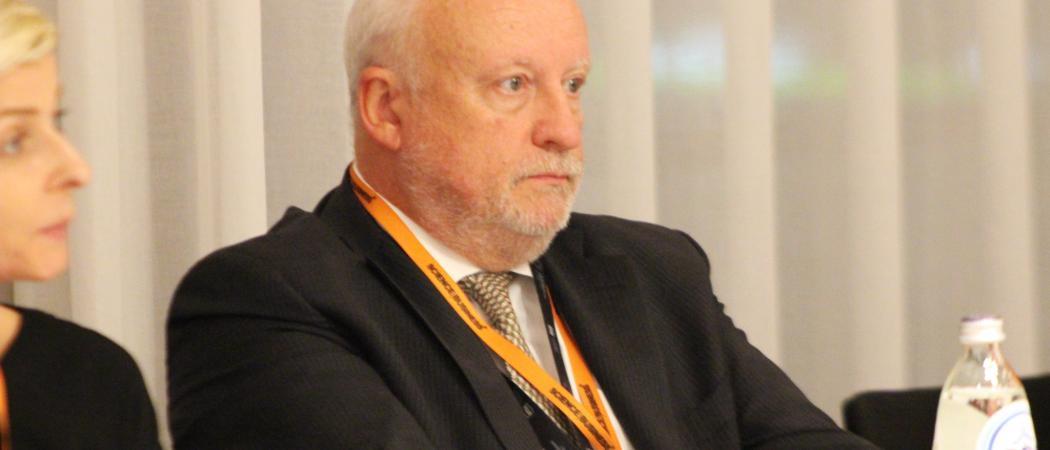This won’t be the last big global health crisis, warns Pierre Meulien, director of the EU’s Innovative Medicines Initiative

Pierre Meulien. Photo: Lysiane Pons, Science|Business
The head of the EU’s big drug research consortium, the Innovative Medicines Initiative (IMI), says the world is learning painful lessons from the coronavirus crisis that will leave it better prepared for future pandemics.
“Whatever happens in the coming years, we will have learned an awful lot through this terrible experience. We will learn how to better deal with pandemics like these in the future,” Pierre Meulien told Science|Business Wednesday.
This won’t be the last big health crisis the world will have to face, Meulien said. “I think we’re going to see an increase in zoonotic (animal to human transmitted) infections, because of increased industrialisation, deforestation and climate change. To cope with these, we’re going to need to come up with a more connected, cross-sector philosophy for dealing with health and the environment,” he said.
Meulien is leading efforts by the IMI to quickly invest €45 million from the EU’s big research programme, Horizon 2020, into new diagnostics and therapeutics for COVID-19. That money is expected to be matched by in-kind contributions from participating pharmaceutical companies.
“This was a new virus, all we can do is look back and learn rather than criticise the initial response,” he said. “We didn’t have any diagnostic or therapeutic tools but we’re learning how to develop these quicker.”
Meulien said that one thing that should emerge from the crisis is a stronger belief in response systems like the Coalition for Epidemic Preparedness Innovations (CEPI).
Set up after the Ebola epidemic of 2014, CEPI is investing hundreds of millions of euros from governments and organisations like the Bill & Melinda Gates Foundation into promising COVID-19 test-vaccines.
“I’m a great believer in form following function – CEPI had a real goal in mind before they set up, with four or five pandemics in their sights. They don’t need to create mechanisms that will remain forever but rather do a particular job for a particular time – this type of fluid organisation will be key going forward,” he said.
Meulien however acknowledges the risk that knowledge on COVID-19 won’t be passed on quickly enough, or certain countries will decide to respond in isolation from the rest.
“There’s a real danger we go and test different treatment regimes in a fragmented way. There’s the risk we won’t optimise some of the knowledge that is there to be gleaned from all the studies happening globally,” he said.
As a hedge against this risk, Meulien highlights the work of GloPID-R, an international network of funders including the World Health Organisation, the Wellcome Trust and the European Commission, which is helping to come up with a research response to the pandemic.
Learning from countries that remain relatively unaffected by the virus will also be key, Meulien said.
“We will have to look very carefully at how the virus performs in the global south during their winter months (our summer). COVID-19 could be a seasonal illness, but we don’t know yet,” Meulien said.
Some people hope that outbreaks of coronavirus will wane as temperatures rise. Whether or not COVID-19 follows the same seasonal pattern as illnesses like influenza will be an issue of intense interest for researchers in the months ahead.
Project shifts
Meulien is expecting a flood of applications next week for IMI’s hastily arranged COVID-19 research call.
A typical IMI project takes about five years on average to complete, and grants are usually allocated within eight months of proposals being submitted, but in this case the first projects will be ready to start in June.
With 120 other projects already running, Meulien expects a certain amount of churn in IMI’s work. “The telephone is very hot at the moment, as you can imagine,” he said.
Some studies will be adjusted or put on hold to prioritise COVID-19 work.
“We’re looking at it case-by-case, and we’ll be as flexible as possible,” Meulien said. “When society is faced with a situation like this – a true emergency – priorities can be changed.”





 A unique international forum for public research organisations and companies to connect their external engagement with strategic interests around their R&D system.
A unique international forum for public research organisations and companies to connect their external engagement with strategic interests around their R&D system.